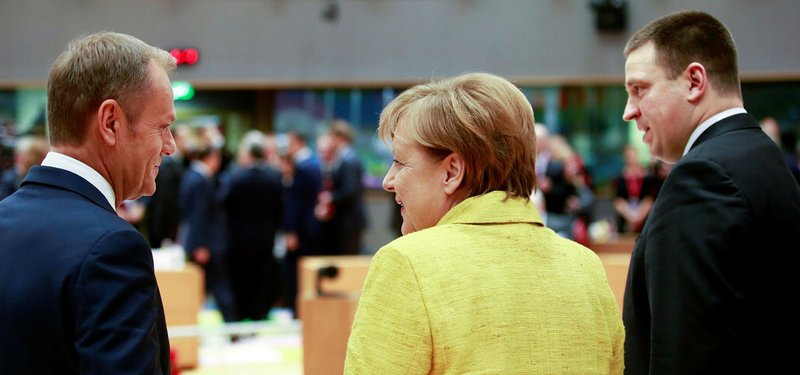
EU leaders criticize Tusk's take on 'ineffective' migrant quotas
EU leaders have lashed out at European Council's President Donald Tusk over his opposition to mandatory refugee quotas.
- World
- DPA
- Published Date: 12:00 | 14 December 2017
- Modified Date: 07:32 | 14 December 2017
Several European Union leaders criticized European Council President Donald Tusk during an EU summit on Thursday, after he said that mandatory quotas to relocate migrants within the bloc had been "highly divisive" and "ineffective."
Tusk made the comments ahead of the two-day summit, where the leaders are having a political discussion on migration in an effort to seek a lasting solution for the crisis, which became acute in 2015.
Arriving at the summit, German Chancellor Angela Merkel called Tusk's new approach "not sufficient," warning that internal solidarity cannot be dropped to focus only on stemming the flow of migrants outside the bloc.
"Among EU members states, there can't be such selective solidarity from my point of view," she said.
She warned that the EU's current migration system was "not working at all," because it put undue burden on the border countries, which is why internal EU solidarity was also necessary.
Austrian Chancellor Christian Kern said the discussion initiated by Tusk was "completely incompehensible."
"I am really unhappy about Tusk's formulation," Kern said, noting that the spirit of Europe was that "advantages are enjoyed together and burdens are also carried together."
French President Emmanuel Macron also stressed the importance of solidarity.
Tusk said at the sidelines of the summit that there were divisions between "East and West" in the EU on the issue.
"These divisions are accompanied by emotions which make it hard to find even a common language and rational arguments for this debate," he said. "This is why we should work on our unity even more intensively and more effectively than before."
Countries that have been fierce opponents of the EU scheme to redistribute migrants welcomed Tusk's new approach.
"I think that Mr Tusk said the truth, he said what we are thinking," Czech Prime Minister Andrej Babis said on Thursday.
Slovak Prime Minister Robert Fico said he "fully" supported Tusk's idea, noting that Slovakia has rejected quotas "from the very beginning."
Meanwhile, the Czech Republic, Hungary, Poland and Slovakia offered 35 million euros (41 million dollars) to assist an EU project aiming at beefing up border protection in Libya.
The move to financially assist the Italian-led project in Libya is meant to demonstrate efforts by the four countries, which belong to the so-called Visegrad group within the EU, to pull their weight on providing solutions to migration questions.
The Visegrad 4 have long been critical of EU policies on mandatory quotas to relocate migrants arriving to Italy and Greece onwards to other EU nations.
The offer was announced after a meeting of Visegrad 4 leaders with Italian Prime Minister Paolo Gentiloni and European Commission President Jean-Claude Juncker.
Hungarian Prime Minister Viktor Orban said that the EU's policy to defend outside borders and work to tackle the root causes of migration is the policy that has "worked and operated well on the ground, delivered the result we have expected."
"So that's the reason why, in that element of the migration policy, we would like to strengthen our cooperation," Orban said.
Juncker said he had asked Visegrad countries during the summer to reflect on how they can assist with the EU's migration policy, because he felt that there had been "misunderstandings" and the different sides didn't know "what the other really thinks."
Juncker welcomed the regional group's announcement, calling it "proof that the Visegrad 4 countries are fully aligned when it comes to solidarity with Italy and with others."
Gentiloni, however, held back on hailing the move as a breakthrough. He said he "appreciated" that the assistance came from countries that "have maybe the most distant position from that of Italy" on migration.
"This distance naturally will not change following this decision," he said, noting that Italy would continue to push for mandatory quotas on relocating migrants.
On Friday, the leaders are expected to move on to the topic of Brexit, giving approval to proceeding to the second phase of talks with departing member state Britain.

